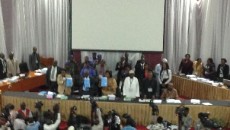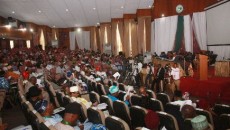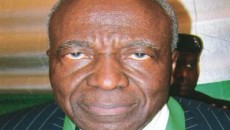Rejects proposal for the creation of Ministry of Desertification and Afforestation
The National Conference on Monday approved the recommendation of its Committee on Environment to allow people own and manage the resources in their territories.
It also approved the recommendation of the committee seeking the transfer of Ecological Fund from the Presidency to the Federal Ministry of Environment while disbursement from the funds should be strictly on identifiable projects.
The Conference however rejected an amendment to the report calling for the creation of a ministry to address the issues of deforestation and desertification in the northern part though it approved an agency to handle the issues.
The 54-page report of the Committee chaired by Florence Ita-Giwa, a former senator, was discussed and voted on after considering over 30 amendments to it.
The 17-member Committee recommended what it termed “Resource Democracy,” which it described as “The right of the people to own and manage their resources by entrenching resource democracy gives rights to federating units to prospect for developing resources in their territories.
It said, “This will remove conflicts between the federating units and promote progressive and active development.”
The recommendation was approved despite its rejection by the northern delegates during the debate on the report.
The Conference also voted to have environmental issues of the Concurrent List even as it approved another recommendation calling for the implementation of the report of the United Nation on Environment Programme, UNEP, on Ogoni, Rivers State.
The UNEP had recommended the cleaning up of the Ogoni Land, which could take up to 30 years and would cost an initial $1 billion.
Other recommendations and amendments to the report of the Committee adopted include the construction of two new dams in the lower part of the River Niger to control flood; that flooding should be declared a national disaster wherever it occurs in the country; that constitutional rights to environment should be justifiable; that proceeds from the penalty for gas flaring should be paid to the communities instead of the Federal Government and ban on defecation in open places in the country.
The Conference rejected the recommendations calling for the removal of the Land Use Act from the 1999 Constitution, creation of an Ecological Commission as well as Special Court on Environment.
Presenting the report earlier, Ms. Ita-Giwa said every decision arrived at was exhaustively researched and debated while experts in various areas of environment-related disciplines were invited for professional inputs and suggestions.
During the debate, a delegate from Cross River State, Orok Duke, lamented the increasing desertification of some northern parts of the country and the increasing dislocation of the Niger Delta communities.
Mr. Duke openly read a poem to demonstrate the suffering of Bakassi people and Niger Delta natives in the face of serious environmental problems.
A Federal Government delegate, Ledum Mittee, said sellers of plastic bags should be taxed and the funds should be used in remedying the effects the bags had on the environment.
Mr. Mittee, who hails from River State, said he wondered why government had been collecting and pocketing fines from oil firms on account of gas flaring when communities were bearing the brunt of the dangerous practice.
A former senator from Bayelsa State, John Brambaifa, said the Niger Delta suffers the brunt of oil pollution and that the laws do not support the people.
“We must start looking at some of these laws to ensure that they do not favour the polluters,” he said.
A Kebbi State delegate and former acting National Chairman of the Peoples Democratic Party, PDP, Bello Mohammed backed the transfer of Ecological Fund from the Presidency to the Federal Ministry of Environment while Sola Ebiseni, representing the Forum of Local Government Chairmen, demanded that environment be put under the concurrent list of the Constitution.
Anietie Okon, a former senator from Akwa Ibom State, expressed regrets that whenever resource control is mentioned people easily think of oil even though other types of minerals had been identified and listed. According to him, resource control is necessary for nation’s development.
Another delegate, Isaac Osuoka, said the issue of desertification should be treated as an issue of national emergency so that the situation could be arrested before it would get out of hand.
A former governor of Bayelsa State, Diepreye Alamieyeseigha, said listening to the comments of some delegates clearly showed that most of them did not understanding what other Niger Delta people were going through.
He suggested that people in authority should go round this country so that they could appreciate others.
“Our wealth is no longer on land, but deposited in the sea and that the offshore was once on land,” he said.
Mr. Alamieyeseigha said some towns had been wiped out and that money shared in Abuja every month was drawn from the Niger Delta swamp.
According to him, to construct a kilometer of road in the region was 10 times more than what it would take to construct a similar road in other parts of the country.
“When we are talking of resource management we know what we are talking.”
He concurred that the north was being plagued by desertification, but noted, “It is clear that when sand is coming you see it, but you can’t fight water when it is coming.”



